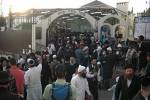Concern mounting over provocation on the eve of Hasidic Pilgrimage to Uman

With the arrival of Hasidic pilgrims to Uman just over a week away, concern is strong regarding the Orthodox cross recently erected in a place of religious significance to the pilgrims. The actions seem clearly directed at provoking conflict and inciting inter-ethnic and inter-faith enmity.
An appeal has been launched calling on the authorities to take proper measures to prevent ethnic and religious enmity in Uman (Cherkasy oblast) during the annual pilgrimage by Hasidic Jews to the grave of Rabbi Nachman from Breslov.
Pilgrims from all over the world come each year at Rosh Hashana [the Jewish New Year] to Uman where Rabbi Nachman had asked to be buried in Uman. His followers say that he promised to intercede on behalf of anyone who came to pray at his grave on Rosh Hashana.
The imperative to make this pilgrimage for Hasidic Jews is great and over recent years around 20 thousand pilgrims have come each year.
The appeal stresses that this is not only an important event for Hasidic Jews, but also makes serious financial demands on the pilgrims with hotel rooms alone reaching 4-5 hundred US dollars per day.
This is clearly also a source of income for a very large number of Uman residents, as well as providing possibilities for attracting capital to, for example, improve the city’s infrastructure.
The yearly pilgrimage is also an opportunity for Ukraine to welcome visitors and establish a positive reputation.
It is therefore frustrating that we are once again seeing moves aimed at obstructing the pilgrims and stirring up enmity and tension during their pilgrimage.
In 2011 local activists began such a campaign, claiming to represent a Council of Uman Civic Organizations. At that time, Viktor Dunayev from an organization called “We are from Uman” told Viacheslav Likhachev from the Congress for National Communities that the activists would be engaging in various illegal activities aimed at stopped what they claimed was an “invasion” of foreigners. Such methods included acts of vandalism to memorials in Hebrew; offensive chants, etc.
They were clearly hoping to provoke trouble. Thankfully this was averted, however the activists went on to launch a civic campaign entitled “Uman without the Hasidim”. This was overtly anti-Semitic and resulted in a clash between members of a march against the pilgrimage and the police.
The campaign was supported by activists from ultra-nationalist groups from other regions, in the first instance VO Svoboda and its youth organization “Sokil”. Of the several dozen members of the march detained for public order offences, there were virtually no local residents.
The authors of the appeal stress that although mass disturbances were averted due to decisive measures from the police and authorities, the overtly anti-Semitic nature of the campaign gained very wide and negative publicity abroad.
Recent events are therefore of great concern. A month and a half before Rosh Hashana, this same Council of Uman Civic Organizations erected an Orthodox cross on the opposite bank of a large pond used for Hasidic rituals. The cross was not agreed with the authorities, and Viacheslav Likhachev points out that its position means that during one of the ceremonies to mark Rosh Hashana, the pilgrims will be forced to pray with the Orthodox cross before them. This is clearly unacceptable and an affront to them.
Deputy Mayor V. Biblyy is suggesting moving the cross to another place, yet at present this is facing resistance from the Council of Uman Civic Organizations and those supporting them. The Secretary of the Council notes that the erection of the cross is particularly incomprehensible as the pond has religious significance to the Hasidim, none to Christians.
Now a member of the VO Svoboda Party, Serhiy Yaremchuk has got involved, proposing to establish 24-hour “guard” on the cross if the police refuse to guard it. Yaremchuk is also claiming that words written on the cross supposedly by Hasidim, which are the Hebrew for “Do not anger God” are not simply hooliganism, but vandalism aimed at inciting inter-ethnic enmity.
It seems clear that the cross was erected solely to provoke conflict. This is inevitable as soon as pilgrims begin arriving, and is doubtless intended to provoke a reaction from them which will then be used to stir up animosity among the local population to Orthodox Jews.
The appeal calls on the central and local authorities and the public to put a stop to this provocation and incitement to enmity, and to prevent violence. The conflict must be resolved before the beginning of September with Rosh Hashana falling this year on 4/5 September. It suggests either moving the cross, or at least erecting a temporary barrier, fence etc so that the Hasidic pilgrims do not see it.
“We wish to stress that it is the local authorities and the police who bear full responsibility for this pilgrimage which is so important both for Uman, and for all of Ukraine, taking place peacefully and without conflict.”
The appeal is available here http://onlinepetition.in.ua/antihate/petition.html and can be endorsed by pressing the blue frame at the top with the words ПОДАТИ ПЕТИЦІЮ
Photo from Wikipedia





